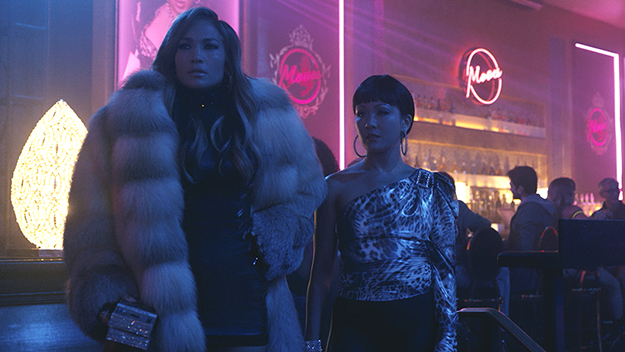News to Me: Leigh Ledare, Mark Cousins, and Venice to Toronto

Jennifer Lopez and Constance Wu in Hustlers (Lorene Scafaria, 2019)
1) This weekend saw the 76th Venice Film Festival close with Lucrecia Martel’s jury awarding major prizes to actors Luca Marinelli and Ariane Ascaride, director Roy Andersson, and, winning the Grand Jury Prize for his film An Officer and a Spy, Roman Polanski. But the festival’s top honor, the Golden Lion, went to none other than Todd Phillips’s Joker—a film recently discussed by FC Editor-in-Chief Nic Rapold and Los Angeles Times critic Justin Chang on our podcast.
2) With Venice come and gone, the film world now flocks to the Toronto International Film Festival, which kicked off on Thursday night with Once Were Brothers: Robbie Robertson and The Band. We’ll have coverage pouring in over the coming days, but in the meantime: check out our own Ela Bittencourt for Hyperallergic, reporting on the best experimental shorts at TIFF’s Wavelengths section—“a rare opportunity to catch the latest work from some of the most exciting experimental filmmakers working today, along with some restored gems.”
3) “Much of what we assume about movies is off the mark. It’s time to redraw the map of movie history that we have in our heads. It’s factually inaccurate and racist by omission.” These words come just a few minutes into Mark Cousins’s opus, The Story of Film: An Odyssey. Now, nearly twenty years on, Cousins hopes to reconfigure the canon yet again with Women Make Film: A New Road Movie Through Cinema. Playing in five (apparently stand-alone) parts at TIFF, the 14-hour project re-teaches filmmaking as a kind of 101 class—this time using only female directors as examples (700 clips from 183 directors, to be exact).
4) More in the way of women at TIFF: Vulture recently posted this group interview on “The Hustle Behind Hustlers”—Lorene Scafaria’s true-crime story about a group of strippers turned scammers. “Part of the struggle of getting this movie made was not the crime-drama element of it,” Scafaria states, “but the judgement that people have about strippers. I don’t fault any stripper or sex worker for trying to make ends meet in a world that values women for their bodies.” Hustlers also employed a “comfort consultant” on the film, a practice coming into favor with more sex-oriented storytelling: this piece from Rolling Stone tells the story of HBO’s The Deuce recognizing its need for an “intimacy coordinator.”
5) NANG, a formerly print-only magazine focused on “cinema and cinema cultures in the Asian world,” has just released a special online issue dedicated to Alexis Tioseco and Nika Bohinc—two film critics killed while living in the Philippines. To celebrate their lives “Ten Years After,” NANG published 27 short pieces from emerging film critics across the globe, with personal essays on Kaili Blues, Burning, and Kaala, among others.
6) Leigh Ledare’s The Task is now available to stream for free on the artist’s website. Originally conceived as the centerpiece of The Plot—a multimedia exhibition focused on modern social relations—Ledare’s film “is a tesseract made of mirrors, implicating and absorbing all who see it, erasing the boundaries between viewer, artist, and subject,” according to Dan Schindel. We interviewed Ledare as part of our November-December 2018 issue, where the filmmaker described The Task as establishing “an institution whose purpose it is to study itself. And institutions can be places where we hide our psychic baggage.”
7) Two pieces of note recently popped up over at Bookforum: the first, growing out of the ongoing Reagan revival, pits A.S. Hamrah against the Dream Life. Unpacking Mark Weinberg’s 2018 memoir, Movie Nights with the Reagans, Hamrah investigates how Hollywood films informed Ronald Reagan’s worldview, and became his politics (“There were ramifications for everyone if President Reagan happened to see, for instance, Rocky IV over the weekend”). The second comes from Melissa Anderson of 4Columns, writing on the new biography, Sontag: Her Life and Work, by Benjamin Moser. Before diving in, Anderson quotes Susan Sontag’s Under the Sign of Saturn: “One cannot use the life to interpret the work. But one can use the work to interpret the life.”
8) “Criticism is companionship. For those growing up in communities where art is not a subject of everyday conversation, aesthetic experience can be isolating and bewildering . . . Before assuming a position as tastemaker or teacher, the critic is first a kind of imaginary friend.” Though sadly Anderson-free, 4Columns makes its return from summer hiatus this week. Andrew Chan reopens its film column with this piece on the posthumous release of Gilberto Perez’s The Eloquent Screen. (Also inside: J. Howard Rosier on Virgil Abloh—not the first hip-hop artist, but “he might be the first hip-hop artist.”)
9) Terrence Malick is well underway with his next project, The Last Planet, which tells the life of Christ through various evangelical parables. Though previous reports noted only that Malick was filming on location in Rome, we now know some casting essentials thanks to The Film Stage: Géza Röhrig, star of Son of Saul, will play Jesus, with Matthias Schoenaerts as St. Peter and Mark Rylance as Satan (possibly bearded, possibly cross-dressing—Rylance seems unsure).
10) The Paris Review recently published this piece by novelist Tash Aw, titled “The Brief Idyll of Late-Nineties Wong Kar-wai.” In it, Aw recalls the summer of 1997, “a short era of innocence before the complicated decades that lay ahead,” forever crystalized in the images of Wong’s Happy Together. (Only a few summers on, Kent Jones would write on In the Mood for Love, comparing the two films: “Whereas most of Happy Together consists of Liu-fai and Ho-ping’s dance of devotion and rejection, most of In the Mood for Love is given over to Mr. Chow and Mrs. Su’s dance of longing and fear.”)
We leave you this week with a special plea from the Filmmakers’ Co-Op: a fundraiser to help upgrade their preservation capabilities and to make their archive available for streaming!
https://vimeo.com/349501743







